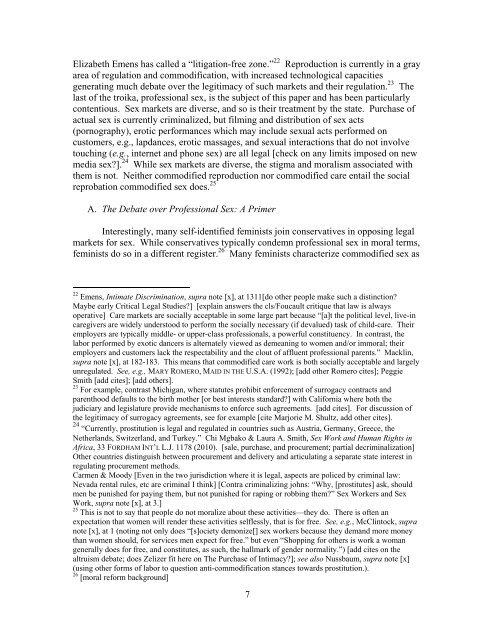1 Regulating Sex Work Adrienne D. Davis VERY ROUGH DRAFT ...
1 Regulating Sex Work Adrienne D. Davis VERY ROUGH DRAFT ...
1 Regulating Sex Work Adrienne D. Davis VERY ROUGH DRAFT ...
Create successful ePaper yourself
Turn your PDF publications into a flip-book with our unique Google optimized e-Paper software.
Elizabeth Emens has called a “litigation-free zone.” 22 Reproduction is currently in a gray<br />
area of regulation and commodification, with increased technological capacities<br />
generating much debate over the legitimacy of such markets and their regulation. 23 The<br />
last of the troika, professional sex, is the subject of this paper and has been particularly<br />
contentious. <strong>Sex</strong> markets are diverse, and so is their treatment by the state. Purchase of<br />
actual sex is currently criminalized, but filming and distribution of sex acts<br />
(pornography), erotic performances which may include sexual acts performed on<br />
customers, e.g., lapdances, erotic massages, and sexual interactions that do not involve<br />
touching (e.g., internet and phone sex) are all legal [check on any limits imposed on new<br />
media sex?]. 24 While sex markets are diverse, the stigma and moralism associated with<br />
them is not. Neither commodified reproduction nor commodified care entail the social<br />
reprobation commodified sex does. 25<br />
A. The Debate over Professional <strong>Sex</strong>: A Primer<br />
Interestingly, many self-identified feminists join conservatives in opposing legal<br />
markets for sex. While conservatives typically condemn professional sex in moral terms,<br />
feminists do so in a different register. 26 Many feminists characterize commodified sex as<br />
22 Emens, Intimate Discrimination, supra note [x], at 1311[do other people make such a distinction?<br />
Maybe early Critical Legal Studies?] [explain answers the cls/Foucault critique that law is always<br />
operative] Care markets are socially acceptable in some large part because “[a]t the political level, live-in<br />
caregivers are widely understood to perform the socially necessary (if devalued) task of child-care. Their<br />
employers are typically middle- or upper-class professionals, a powerful constituency. In contrast, the<br />
labor performed by exotic dancers is alternately viewed as demeaning to women and/or immoral; their<br />
employers and customers lack the respectability and the clout of affluent professional parents.” Macklin,<br />
supra note [x], at 182-183. This means that commodified care work is both socially acceptable and largely<br />
unregulated. See, e.g., MARY ROMERO, MAID IN THE U.S.A. (1992); [add other Romero cites]; Peggie<br />
Smith [add cites]; [add others].<br />
23 For example, contrast Michigan, where statutes prohibit enforcement of surrogacy contracts and<br />
parenthood defaults to the birth mother [or best interests standard?] with California where both the<br />
judiciary and legislature provide mechanisms to enforce such agreements. [add cites]. For discussion of<br />
the legitimacy of surrogacy agreements, see for example [cite Marjorie M. Shultz, add other cites].<br />
24 “Currently, prostitution is legal and regulated in countries such as Austria, Germany, Greece, the<br />
Netherlands, Switzerland, and Turkey.” Chi Mgbako & Laura A. Smith, <strong>Sex</strong> <strong>Work</strong> and Human Rights in<br />
Africa, 33 FORDHAM INT’L L.J. 1178 (2010). [sale, purchase, and procurement; partial decriminalization]<br />
Other countries distinguish between procurement and delivery and articulating a separate state interest in<br />
regulating procurement methods.<br />
Carmen & Moody [Even in the two jurisdiction where it is legal, aspects are policed by criminal law:<br />
Nevada rental rules, etc are criminal I think] [Contra criminalizing johns: “Why, [prostitutes] ask, should<br />
men be punished for paying them, but not punished for raping or robbing them?” <strong>Sex</strong> <strong>Work</strong>ers and <strong>Sex</strong><br />
<strong>Work</strong>, supra note [x], at 3.]<br />
25 This is not to say that people do not moralize about these activities—they do. There is often an<br />
expectation that women will render these activities selflessly, that is for free. See, e.g., McClintock, supra<br />
note [x], at 1 (noting not only does “[s]ociety demonize[] sex workers because they demand more money<br />
than women should, for services men expect for free.” but even “Shopping for others is work a woman<br />
generally does for free, and constitutes, as such, the hallmark of gender normality.”) [add cites on the<br />
altruism debate; does Zelizer fit here on The Purchase of Intimacy?]; see also Nussbaum, supra note [x]<br />
(using other forms of labor to question anti-commodification stances towards prostitution.).<br />
26 [moral reform background]<br />
7














